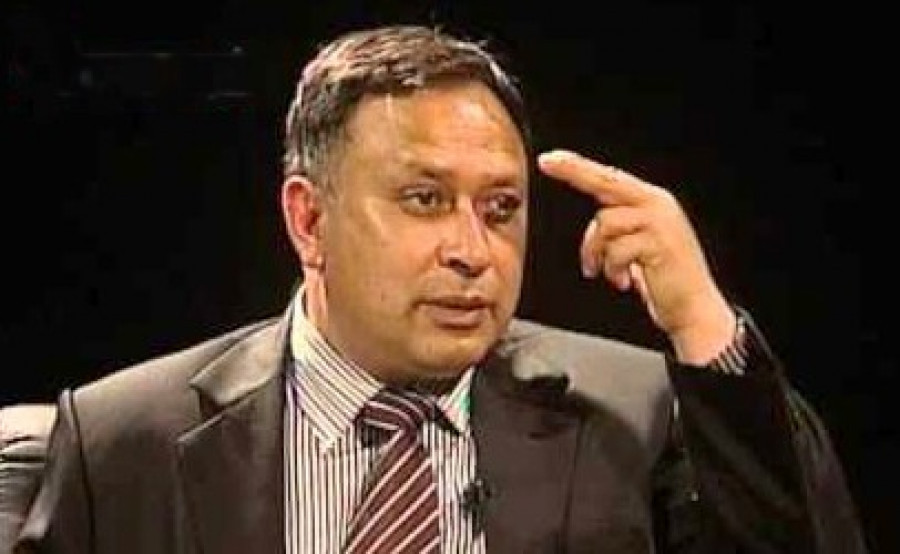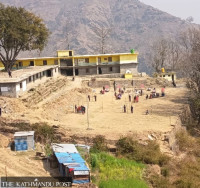National
Karki recuses himself after lawyers question why he was on bench
Next hearing on writs against House dissolution on January 13 will focus on whether the five-member Constitutional Bench should hear them or send them to extended full bench.
Binod Ghimire
A hearing on writs against Prime Minister KP Sharma Oli government’s decision to dissolve the House of Representatives was adjourned on Wednesday after Justice Hari Krishna Karki recused himself from the Constitutional Bench.
Karki was picked as one of the four members of the Constitutional Bench by Chief Justice Cholendra Shumsher Rana.
Rana leads the bench.
Rana’s decision to pick Karki had run into controversy when the Constitutional Bench started a hearing on December 25. Justices Bishowambhar Prasad Shrestha, Anil Kumar Sinha and Tej Bahadur KC are the other members of the Constitutional Bench. Rana had selected the four justices from the roster of 14. He had decided to continue with the same composition on Wednesday.
“Justice Karki decided not to be part of the Constitutional Bench that is hearing the writs against dissolution of the House of Representatives,” Kishor Poudel, a communication expert at the Supreme Court, told the Post. “The chief justice will pick another justice to replace Karki.”
When the hearing began on Wednesday, advocates Shambhu Thpaa, Dinesh Tripathi and Mukti Pradhan, among others, who argued on behalf of the petitioners, questioned if Karki could sit on the bench.
“It’s not that we are doubting Karki's competence,” Tripathi told the Post. “However, it is an ethical issue. It is good that he opted out of the bench.”
The advocates on Wednesday had questioned Karki if he should sit on the bench if he believed in the principle of natural justice.
During his first stint as prime minister in 2015, Oli had appointed Karki as the attorney general.
By virtue of being the attorney general, Karki hence was the chief counsel to Oli and his government then.
Since the case being heard by the court is also against Oli and his government, advocates had raised questions about Karki’s presence on the bench.
Apart from questioning Karki on the bench, advocates on Wednesday also argued that the writs be sent to an extended full bench of the Supreme Court.
As many as 13 writs have been filed at the Supreme Court challenging Oli’s decision to dissolve the House of Representatives on December 20. Petitioners and experts on constitutional affairs say Oli made an extra-constitutional move by dissolving the House, as the constitution does not allow him, as a majority prime minister, to do so.
After a preliminary hearing on December 23, a single bench of Chief Justice Rana had decided to forward 12 writs—one had already been sent—to the Constitutional Bench.
The bench on December 25 had heard opening remarks from lawyers arguing on behalf of the petitioners and issued a show-cause notice to the Oli government and the Office of the President demanding reasons for dissolving the House.
As per Clause 22 of the Supreme Court Regulation, an extended full bench means a bench comprising five or more justices. Such a bench is formed to interpret complex legal or constitutional questions.
Though there were debates whether there should be a separate Constitutional Court, the drafters of the constitution had agreed to have a Constitutional Bench under the Supreme Court to decide matters should a serious constitutional confusion arise.
As per Article 128 (1) of the constitution, the Supreme Court has the final power to interpret the constitution and laws.
Article 137 talks about the formation of the Constitutional Bench.
According to Article 137 (1), the Constitutional Bench hears and takes decisions on disputes over the jurisdiction between the federation and a province, between provinces, and between a province and a local level. Article 137 (3) authorises the chief justice to allocate the cases under consideration at the Supreme Court containing questions of serious constitutional explanation to the Constitutional Bench.
Advocates on Wednesday, however, argued that Oli’s House dissolution move was prima facie unconstitutional, that it did not need serious constitutional explanation and that a decision can be made by an extended full bench rather than the Constitutional Bench.
Chandra Kant Gyawali, a senior advocate who is arguing on behalf of the petitioners, said the hearing next week will start with arguments whether or not to send the 13 writs filed against the dissolution of the House to the extended full bench.
After Karki recused himself, the next hearing has been scheduled for January 13.
If the Constitutional Bench, after the next hearing, agrees to send the writs to an extended full bench, such a bench consisting of 9 to 11 justices needs to be constituted.
“The constitution says the Supreme Court—not the Constitutional Bench—is the final interpreter of the constitution,” said Gyawali. “Similarly, the court in the past has approved the House dissolution twice and rejected such a move as many times. So we don’t have a set precedent.”
In 1994 and 2002, the Supreme Court had approved the moves of then prime ministers Girija Prasad Koirala and Sher Bahadur Deuba of dissolving the House of Representatives, while it had rejected Manmohan Adhikari and Surya Bahadur Thapa governments’ similar moves in 1995 and 1998, respectively.
Gyawali said there has been a practice in the past to form an extended full bench on such issues.
“The five-member Constitutional Bench is too small to decide on the matter,” Gyawali told the Post.
Not all agree though.
According to Bipin Adhikari, former dean at the Kathmandu University School of Law, the Constitutional Bench can decide on the matter.
“This is a straightforward case of breach of the constitution,” Adhikari told the Post. “There is no complexity in this case as the dissolution of the House doesn’t stand any constitutional ground.”
Since the next hearing on January 13 will focus on whether the Constitutional Bench should continue or send the case to an extended full bench, a final decision is likely to take time.
“I don’t see the need for an extended full bench,” said Adhikari. “This will only delay the decision-making process.”




 27.41°C Kathmandu
27.41°C Kathmandu














